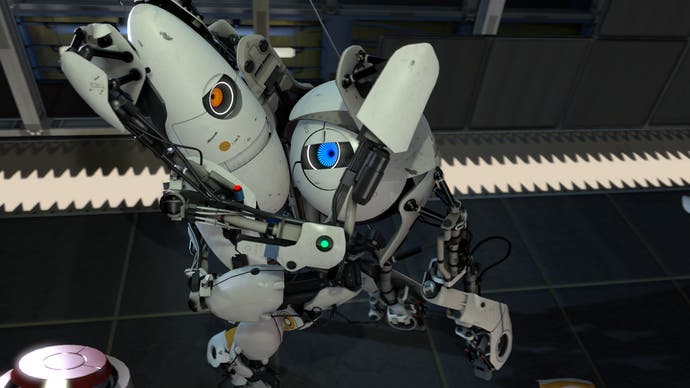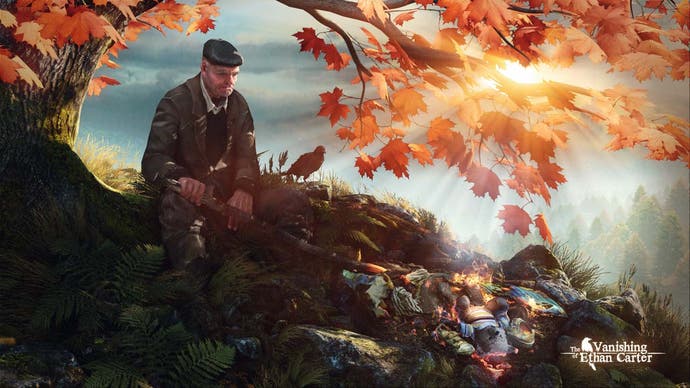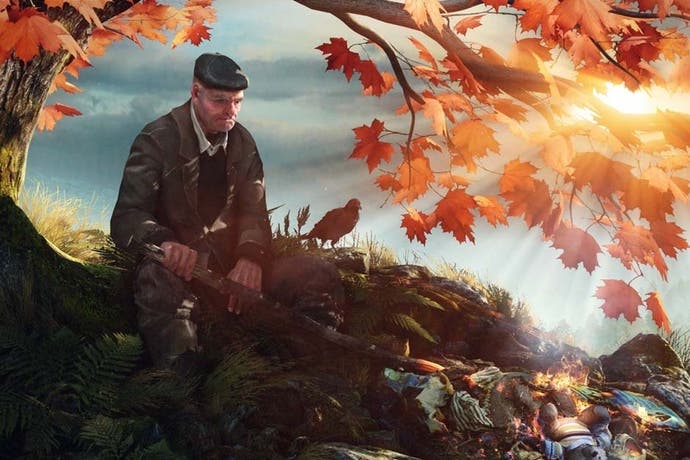Saturday Soapbox: Lower your weapons
Combat is fine, but it's not the only way to make a hit.
Every year at E3 I hear the same sentiment uttered countless times: "This was the worst E3 yet." In some cases this might be due to journalists becoming increasingly weary with their chosen profession, but by and large this ennui is triggered by the notion that the industry is saturated by triple-A action games.
You can't spin 90 degrees at a trade show without seeing an overblown kiosk devoted to a game about space marines, zombies, dragons and the many spectacular ways you can eviscerate them. At a glance, it's easy to deduce the video game industry has shifted its focus from portly platforming plumbers to grit and guns. Heck, even the nerdiest of gaming mascots - Lara Croft - has transitioned from brainteasers to mass murder. Remember when that series was about raiding tombs?
It's not that games are too violent (I don't think they are, but that's another topic for another time), but that too many games are trying to be be the same thing - and it just gets boring after a while. It's easy to get the impression that there's a digital arms race, with every publisher trying to outgun the others with "bigger, better and more badass" sequels. But I think we've reached the turning point where audiences are no longer clamouring for that. We're seeing more and more developers realising that there are other ways of gripping audiences that don't involve any combat whatsoever.
Two years ago our Oli Welsh said of Portal 2, "Far from insignificantly, it's also a major video game that involves virtually no combat." This was noteworthy at the time (a triple A puzzle game? Madness!), but I'm delighted to say that it was far from a footnote. Rather, it was a sign of things to come.

Last year there were three games that swept up most Game of the Year awards. They were: The Walking Dead (my pick), Fez (EG's pick) and Journey (the cool kids' pick). Fascinatingly, two of these games - Fez and Journey - featured no combat whatsoever, while The Walking Dead was about one per cent combat. And yet in many cases they took top honours over such triple-A blockbusters as Mass Effect 3, Black Ops 2 and Dishonored.
These combat-free games were not only critical successes, but commercial ones too. As of January, The Walking Dead had sold over 8.5 million episodes, raking in more than $40 million in sales. Journey topped PSN's charts in its release month and - amazingly - nine months later in December. Fez didn't do as well, but it still sold a not-too-shabby 100,000 copies in its first couple of months and will more than likely sell boatloads more when it comes to Steam in May. These numbers may not set the world on fire, but with sequels like Dead Space 3 failing to ignite the charts, the distance between these experimental indies and the bombastic behemoths is starting to close.
These aren't the only fan-favourites without fighting. Aside from the Portal series, indie offerings like Dear Esther, The Unfinished Swan and Thirty Flights of Loving managed to find a sizeable fan base.
Chris Donlan made an excellent point about Thirty Flights, noting that it makes you collect guns and ammo only to deviate from your expectations by allowing your avatar, Agent Abel, to handle the shootouts off-screen while you merely look around and drink in the jazzy tale. Instead of offering you an actual shootout - which enough games already do - it offers something better: a surprise. By stripping the game of guns, its designer Brendon Chung has to come up with other ways to engage the player. In that particular case, plopping them into quick, snappy slices of a comic crime caper was enough.

Importantly, it's not just indie art house designers that are going this route, but also big developers that have a history with violent games. Take Bulletstorm creative lead Adrian Chmielarz, for example. After working on the hilariously profane gib-fest that is Bulletstorm, followed by Epic's chainsaw-sodomising prequel Gear of War: Judgment, he decided to leave the company he started, People Can Fly, to pursue a combat-less "weird fiction horror" game, The Vanishing of Ethan Carter.
Starbreeze, the developer behind such shockingly violent titles as The Darkness, The Chronicles of Riddick and Syndicate, has at least temporarily eschewed its penchant for bullets and bloodshed in its upcoming fairy tale-esque digital download, Brothers: A Tale of Two Sons. Elsewhere, the ex-BioShock 2 devs at The Fullbright Company have splintered off to make their own first-person urban exploration mystery, Gone Home.
So what's going on here? I asked The Fullbright Company co-founder Steve Gaynor what inspired him to make a game with no fighting after working on a blockbuster about a dude with a drill for an arm. He noted that combat is "expensive to make, and make well. A small team (in our case, four people) is not well equipped to make combat that would be as good as the big-budget competition. So whether we'd wanted to do it or not, it wasn't really an option. I think that's true for a lot of indies. You have to figure out how else to make your game interesting.
"But the bigger thing is that we wanted the freedom to explore a story and a kind of experience that you really can't have if the game revolves around combat. Gone Home is about exploring a normal family's house and discovering the believable, everyday drama of these people's lives. There are no ghosts, no zombies, no serial killers or aliens. Modern normalcy is not the kind of theme we could explore if we had to figure out some excuse for wasting a bunch of enemies. Forgoing combat allowed us to make a game that it would have been impossible to make otherwise."
Even big name publishers are noticing this craving for a less murderous experience that's easier to relate to. I can't help but find it noteworthy when a curio like Jonathon Blow's first-person puzzler The Witness is a major selling point for the PS4 at Sony's press conference (even if it was preceeded by a new Killzone).
I want to make it clear that there's a distinction between violence and combat. Games without combat can still be plenty violent, such as The Walking Dead. Games without violence can still have combat, a la Super Mario. I have no problem with either of these, but I think people tend to think that games have to be violent simply because shooting, slashing and fighting things is fun. And of course, in many cases it is - I wouldn't want to live in a world without Hotline Miami or Revengeance. But it's not the only way to make a game fun, and we're finally getting past the notion that a game without traditional combat mechanics is automatically relegated to casual fare like FarmVille or a hidden object game.
Games without fighting aren't inherently better than those that focus on it, and action games and shooters aren't going anywhere in the near future (I should hope not, anyway) - but we're finding that critics and audiences alike are hungry for more diverse experiences and developers are stepping up to the challenge. Despite how it may look at trade shows, I don't think the industry is in danger of stagnating amid all the testosterone-driven slaughtering fantasy fuel. Quite the reverse.


